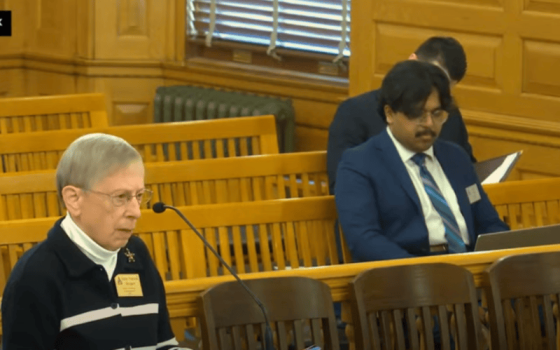
RIO RICO, Ariz. -- What should we do with the 9-year-old boy who slipped across the U.S.-Mexico border on April 12, desperate to find his mother, who came here earlier from their home in El Salvador to find work in hopes of bringing the family to a new life in the United States? Attempts to reconnect him to his mother could expose her to deportation.
What of the fate of another young man crossing the Sonoran Desert on foot near Tucson, Ariz., in early April, whose final cell phone call to his mother told of being abandoned in the rough terrain and how thirsty he was?
The plight of thousands of border crossers and the fate of an estimated 11 million undocumented immigrants now in the United States hoping for a chance at legal status were the focus of a national conference on immigration held April 11-13 here.
Titled “Eucharist Without Borders: God’s Welcoming Table and Comprehensive Immigration Reform,” the conference was sponsored by Celebration, the worship resource of the National Catholic Reporter Publishing Company. It convened 170 church professionals and activists in Rio Rico, near the U.S.-Mexico border at Nogales. Participants committed themselves to mount a national interfaith coalition of religious and human rights advocacy similar to those that supported the civil rights movement of the 1960s and the sanctuary movement of the 1980s, to press Congress to pass fair and humane reforms of immigration policy.
Current rules have focused exclusively on workplace raids, criminalization of civil trespass laws, massive incarceration and deportation of otherwise noncriminal offenders, the breakup of families of mixed legal status, decades-long delays for ordinary visas, and the exposure of millions of undocumented persons to exploitation, racial profiling and human rights abuses.
The conference called specifically for implementation of reforms proposed by the U.S. Catholic bishops and highlighted the tragic disconnect between the church’s core mission and identity in the Eucharist that publicly welcomes God in the stranger, and the negative response by many churchgoers to today’s immigrants.
Through field trips into the Sonoran Desert and at the border, conference-goers experienced the conditions migrants face trying to enter the United States on foot. The Arizona sector of the 1,969-mile U.S.-Mexico border has seen a dramatic increase of attempted crossings since the U.S. Border Patrol began concentrating its resources on urban crossing zones in Texas and California. This strategy funneled migrant traffic into the desert sector of the border, considered so inhospitable that no one would risk crossing there. In fact, an estimated 5,600 migrant men, women and children are known to have perished in the desert since 1994, when the Clinton administration authorized “Operation Gatekeeper.”
Representatives of Humane Borders, No More Deaths, Samaritan Patrols and Coalición de Derechos Humanos (Coalition for Human Rights), all groups founded in Arizona in the past decade to provide aid to migrants, led conference field trips, which included a tour of the border and a visit to the Federal Courthouse in Tucson, where migrants arrested at the border are processed for deportation.
Conference speakers included: Jesuit Fr. William O’Neill, professor of social ethics at the Jesuit School of Theology of Santa Clara University in Berkeley, Calif., an expert on global migration; the Rev. John Fife, human rights activist and retired Presbyterian minister, cofounder of the Sanctuary Movement and the group No More Deaths; Jill Marie Gerschutz-Bell, senior legislative specialist for Catholic Relief Services; John L. Allen Jr., NCR senior correspondent; Elena Segura, director of the Chicago archdiocese’s Office of Immigrant Affairs and Immigrant Education; and, in a joint presentation on ecumenical efforts at the border, Catholic Bishop Gerald Kicanas of Tucson and Methodist Bishop Minerva Carcaño of Phoenix. (For a complete description of the conference talks, visit celebrationpublications.org/conference.)
The conference included an outdoor Mass presided over by Kicanas with a backdrop of mountains and near a large labyrinth created by Tucson’s Most Holy Trinity Parish, the conference’s cosponsor, and local artist Deborah McCullough, who placed shoes and other items found in the desert on the trails used by migrants on the path of the labyrinth and in the conference meeting room as a reminder of the high cost of desert passage.
McCullough dedicated her conference displays to the young man whose final cell phone call left uncertain his fate. Until he or his remains are located, it is assumed that he perished in the desert within miles of the conference site.
As for the 9-year-old boy, thanks to efforts by both immigration lawyer Suzanne Gladney in Kansas City, Mo., and a group of Catholic sisters ministering in Pittsburg, Kan., where the boy’s mother has relocated, his story may have a happier ending. Sr. Martha Aldrete, a member of the Missionary Catechists of the Poor, reported that efforts to reunite the boy with his mother are under way. Returning the boy, whose father is now dead, to El Salvador would endanger him, they argue. His mother, who is now married to a U.S. citizen, is pursuing legal status and is eager to see her son again.
[Pat Marrin is editor of Celebration. Contact him at pmarrin@ncronline.org. You can watch video excerpts from the conference on the Celebration website.]




